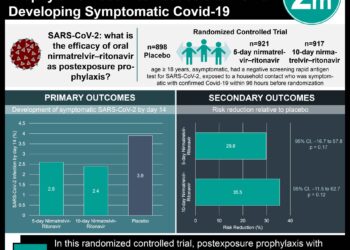Azithromycin does not improve clinical outcomes in high-risk patients with suspected COVID-19 in the community setting
1. 80% of patients in the azithromycin plus usual care group reported feeling recovered within 28 days, compared to 77% in the usual care group.
2. Safety outcomes were similar in both groups with 1% of patients reporting hospital admission and no deaths.
Evidence Rating Level: 1 (Excellent)
Study Rundown: Treatments that can be used to speed recovery from COVID-19 among older adults in the community are crucial. Despite being an antibiotic, azithromycin may have potential antiviral and ant-inflammatory benefits that has led to its use treat patients with COVID-19. Nevertheless, a paucity of evidence exists around the use of azithromycin for community treatment of COVID-19. This randomized controlled trial aimed to assess the effectiveness of azithromycin to treat COVID-19 among older individuals with an increased risk of complications in the community. Co-primary outcomes for this study were time to self-reported recovery and COVID-19-related hospital admission or death, while secondary outcomes included patients’ health, time to sustained recovery, and time to symptom alleviation. According to study results, the proportion of participants that reported feeling recovered within 28 days after randomization was similar between patients in the azithromycin plus usual care group and the usual care alone group. There were no deaths in either study group, with similar safety outcomes in both. Is it worth noting that this study relied on self-reported data and interventions were open-label. While this study focused on higher risk individuals, it would be interesting to assess for the effectiveness of azithromycin treatment among younger patients in the community. Nonetheless, this study is the first to assess azithromycin as a standalone treatment for COVID-19 in community patients.
Click to read the study in The Lancet
Relevant Reading: Hydroxychloroquine with or without Azithromycin in Mild-to-Moderate Covid-19
In-depth [randomized controlled trial]: Between May 22 and Nov 30, 2020, 2265 patients were enrolled from 1460 primary clinics in the UK. Included patients were those ≥ 65 years (or ≥ 50 years with one or more of the following: immunocompromised, heart disease, hypertension, lung disease, etc.) and COVID-19 symptoms in the last 14 days. Patients already on acute antibiotics, or those with a contraindication to azithromycin, were excluded. Altogether, 2120 patients (500 in the azithromycin group, 823 in the usual care group, and 797 in other intervention groups) were included in the analysis. The mean patient age was 60.7 years (standard deviation [SD] 7.8) and 88% of patients had comorbidities.
The primary outcome of self-reported recovery within 28 days was similar in the azithromycin plus usual care group (402 of 500, 83%) and the usual care along group (631 of 823, 77%). Median time to first reported recovery was also similar among patients in both groups (azithromycin plus usual care: 7 days, interquartile range [IQR] 3 to 17 vs. usual care: 8 days, IQR 2 to 23). There was no evidence of a meaningful benefit in the azithromycin group with regard to time to first reported recovery (hazard ratio [HR] 1.08, 95% Bayesian credibility interval [BCI] 0.95 to 1.23). Likewise, the benefit of azithromycin treatment in median time to recovery was 0.94 days (95% BCI -0.56 to 2.43). 3% of patients in each group were hospitalized due to COVID-19 within 28 days of randomization (16 of 500 in the azithromycin group vs. 28 of 823 in the usual care group, absolute benefit 0.3%, 95% BCI -1.7 to 2.2). There was no difference between study groups in terms of secondary outcomes concerning how well patients felt, time to first and sustained alleviation of symptoms, and time to reduction of symptom severity. Safety outcomes were similar in both groups, with no treatment-related deaths. Findings from this study discourage routine use of azithromycin for high risk patients with suspected COVID-19 in the community.
Image: PD
©2021 2 Minute Medicine, Inc. All rights reserved. No works may be reproduced without expressed written consent from 2 Minute Medicine, Inc. Inquire about licensing here. No article should be construed as medical advice and is not intended as such by the authors or by 2 Minute Medicine, Inc.






![Maternal cell-free DNA sequencing superior to standard aneuploidy screening [CARE Study]](https://www.2minutemedicine.com/wp-content/uploads/2014/02/47-karyotype-75x75.jpg)
